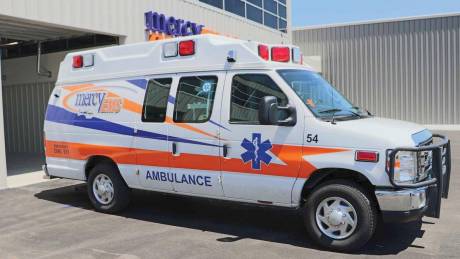

Severe staffing shortages among emergency response units have Genesee County officials searching for the most effective ways to transport residents experiencing mental health episodes to qualified hospitals where they can receive the evaluation and treatment they need.
Tim Yaeger, Emergency Management Services coordinator, and Lynda Battaglia, director of Mental Health & Community Services, led an hour-long discussion via Zoom with county legislators and law enforcement personnel this afternoon about a severely compromised level of ambulance service in the county.
“Why this topic is even being discussed is because there's an EMS (Emergency Management Services) crisis in New York State,” Yaeger said. “We’re looking at counties that are really in a very much of a reactionary form to figure out what they're going to do because the EMS transporting capabilities of the commercial systems are diminished.”
Yaeger said counties across the state are searching for answers as they experience lengthy response times and situations where no ambulances are available at any given time.
“We can probably talk for a long time about it, but it really comes down to pay and work environment and working conditions of the EMS system. That’s why it’s in trouble,” he said.
Emphasizing that his responsibility is to make sure ambulances are there when “the citizens of this county” call for them, Yaeger said he has been talking at length with Battaglia, Mercy EMS and Le Roy Ambulance representatives and law enforcement agency leaders about how to handle mental health incidents that fall under New York Mental Hygiene Law 9.41 and 9.45.
LAW GIVES AUTHORITY TO TRANSPORT
Section 9.41 permits police officers and peace officers to facilitate emergency admissions for immediate observation, care and treatment for any person who appears to be mentally ill and is conducting himself or herself in a manner which is likely to result in serious harm to the person or others. Section 9.45 gives similar authority to directors of community services.
In both cases, transportation to specially designated health care facilities, such as Strong Memorial Hospital in Rochester, Erie County Medical Center or Wyoming County Community Hospital in Warsaw, likely is warranted.
So, the question facing Genesee County legislators is: Who should transport these individuals – emergency medical technicians (or paramedics) in ambulances, police officers (sheriff's deputies, Batavia PD, Le Roy PD) or – what currently is on the table – a combination of both?
With the number of ambulances on the road in Genesee County down from where it should be, Yaeger said he has been working with Mercy EMS to make sure it prioritizes service to Genesee residents.
“Counties outside of Genesee have been relying heavily on Mercy EMS to backfill their shortcomings, and have recently over the last five, six months, it got to a point that was just not manageable anymore,” he said. “So, we worked with Mercy and changed our policy from one ALS (Advanced Life Support) ambulance to two ALS ambulances in service in this county before we will honor an out-of-county ambulance request.”
While the revised schedule is working right now, that doesn’t address the primary focus of today’s conversation – transporting of those in a mental health crisis.
NOT 'LOW HANGING FRUIT'
Yaeger indicated that most surrounding counties use law enforcement personnel to drive the patients to the hospital, but Battaglia – along with Genesee County Sheriff William Sheron – said that, in the majority of cases, is not the way to go.
Calling it “a concerning topic,” Battaglia said those suffering from mental health issues by no means should be considered “low hanging fruit.”
“I wanted to just point that out … that the mental health individuals in the community are also those community residents that need medical services,” she said. “And I have to remind everyone, that somebody that's in a mental health crisis is ultimately considered a medical crisis.”
Battaglia said she was pleased to hear that both Yaeger and County Manager Matt Landers are looking at transports on a case-by-case basis, stating that persons exhibiting symptoms of psychosis are at acute risk of harming themselves or others need assistance from a mental health professional.
“I do have some concerns about EMS medically assessing an individual to determine whether or not police should transport or EMS should transport,” she said. “If somebody is making statements that they are going to die by suicide or if they are having suicidal ideations and deny taking any kind of pills, when in fact they did, and potentially negated telling that to any personnel, that places everybody at risk because they're not going to exhibit any kind of medical symptoms right away.”
WARNING AGAINST STIGMATIZATION
She agreed that the entire EMS and healthcare systems are stressed due to COVID and workforce shortages but warned against the marginalization of the mentally ill.
“… What the system and the advocates have worked really hard about is to not stigmatize and to reduce stigmatization of individuals who are mentally ill,” she offered. “So, if police protocol is to handcuff somebody in a mental health crisis because they're being transported on a 941 and placed them in the back of a police car, that's criminalizing -- that is stigmatizing … and could have detrimental effects. It could possibly force that person to not want to reach out for help in the future; it could be very traumatizing …”
Sheron advised that the county transitioned from police vehicles to ambulances years ago “because of the more humane way to transport somebody that's in crisis.”
“To put somebody in the back of a patrol car behind a cage and in very limited space, I think is not the proper place for somebody who's in mental health crisis -- plain and simple,” he said. “Now, when we have an individual that is violent and we believe that they may become violent in the ambulance, we’ll send somebody along with the ambulance, either following the vehicle or inside the rig itself.”
Other key points brought up during the discussion are as follows:
- Yaeger and Landers agreed that the situation is “not a black and white thing,” with the former acknowledging that the EMS crisis now has taken precedence over the county’s efforts to fix staffing and other issues related to emergency response in the case of fire or motor vehicle accidents.
In response to a question from Legislator Rochelle Stein about the county’s contract with Municipal Resources Inc., a consulting firm based in Plymouth, N.H., Yaeger said MRI's mandate will be expanded from finding solutions to the widening gaps in fire department coverage to also include confronting the EMS dilemma.
- Legislator Gary Maha asked what happens if a call for a mental health transport comes in and no ambulances are available?
Yaeger responded by saying that request would be put on hold. “It’s either that or we’re going to try to get a volunteer ambulance to cover that call. They may cover it, or they may not, but it's going to end up waiting.”
- Legislator Marianne Clattenburg said it is incumbent upon the county “to change how we fundamentally are doing things” by removing elements of criminalization in mental health cases.
“(To place) someone ... in a cop car I just think escalates things and I worry about the liability on the county … if we were to do that,” she said.
She then asked if the county had a contract with Mercy EMS for a certain level of service, to which Landers answered that there is no formal agreement on staffing levels although the county does provide funding to the operation.
- Responding to questions from Legislator Christian Yunker, Landers said there are approximately 500 calls for mental health crisis intervention in Genesee County annually, although many of them end up as family member transports. The plan being considered is to shift up to half from ambulance to law enforcement transport to the three destination hospitals referred to previously in this report.
- Landers said the discussion will continue, and he looks to include Dan Ireland, president of United Memorial Medical Center, as legislators inquired about the possibility of the Batavia hospital becoming certified to accept individuals in the midst of mental health breakdowns.
“They're (Rochester Regional Health administrators) heavily invested in doing everything with the new campus (in Batavia), and obviously, they're doing great things there with the hospital expansion,” Landers said. “So, I would hope that this could be something down the road that we have in our own community, I think there's a need there based on what we're hearing about (the numbers) being transported out of our community.”
- Battaglia, upon hearing that paramedics are not provided with the training to properly handle mental health cases, said she would be willing to provide it.
“Law enforcement knows I've done some trainings for law enforcement. I was just at Le Roy Police a couple months ago, providing mental health training,” she said. “So, if you know that it’s not provided when they’re being trained and going to school, then that is definitely something that I can I can assist with.”
